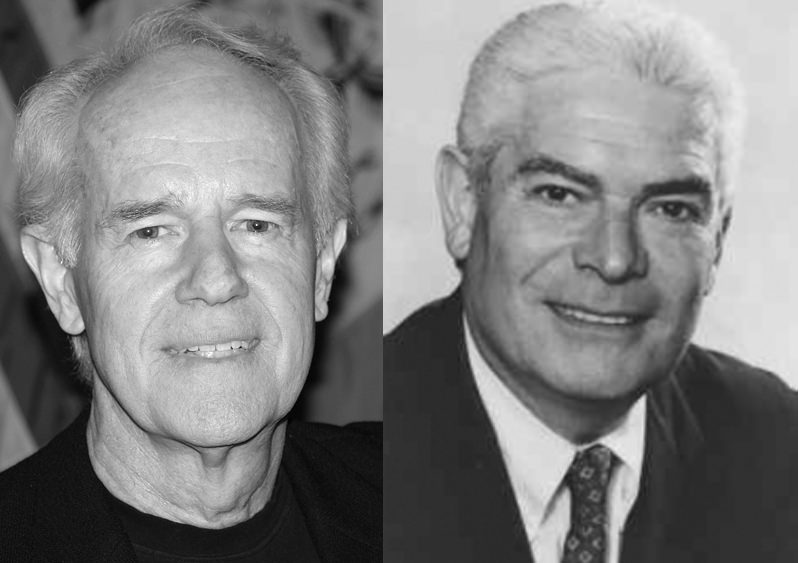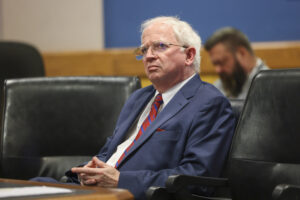How a Former District Attorney Finally Agreed With Activist Mike Farrell on the Death Penalty
Ira Reiner, who served Los Angeles County as D.A. for eight years, and Mike Farrell, president of the board of Death Penalty Focus, have publicly and respectfully debated capital punishment many times over the years. But it wasn't until now, with the proposed Justice That Works Act of 2016 on the California ballot, that they see eye to eye.
Mike Farrell, left, and Ira Reiner. (David Shankbone; Los Angeles County District Attorney’s Office)
Ira Reiner, who served as district attorney of Los Angeles County for eight years, and Mike Farrell, president of the board of Death Penalty Focus, have publicly and respectfully debated the death penalty many times over the years, but it wasn’t until now that Proposition 62, the proposed Justice That Works Act of 2016, is on the California ballot that they at long last see eye to eye.
Read Reiner and Farrell’s joint statement on the pressing issue and watch the clip of Truthdig’s Facebook Live session with Farrell below.
Ira Reiner was district attorney of Los Angeles County from 1984 to 1992. Mike Farrell is an actor and death penalty abolitionist. Reiner, who supervised the prosecution of Richard Ramirez, the “Night Stalker,” felt that the depravity of some crimes provoked a visceral reaction toward the perpetrator that led him to believe “some people don’t deserve to live.” Farrell, while acknowledging the instinctual response to such horror, thought the vital question was, “Do we deserve to kill?”
Given the strength of their personal convictions and the growing resonance of the death penalty issue, the two debated the question in a number of different venues over a period of years, gradually developing a mutually growing respect and eventually a friendship despite their opposing points of view.
Farrell’s involvement with human rights and death penalty abolition efforts across the country eventually led to his becoming president of the board of Death Penalty Focus, an organization devoted to promoting abolition through educating and informing the public about the terrible problems with the death system in America.
Reiner, among other pursuits after leaving office, began to teach law in Israel, commuting to that country for years. There he discussed the use of the death penalty in a nation that did not, except for the “Eichmann exception,” practice it. With some distance from the complex decision-making process in his former office, he re-examined his difficulty with choosing death when many defendants were represented by counsel far less experienced than his staff. He saw that with so many people involved, so many perspectives to be considered, with pressure from both the public and departmental needs and ambitions, it is impossible for one to make a purely rational choice.
No matter how hard one tries to gain the clarity necessary to assume the moral authority to deem a human life valueless, he realized, he can never achieve the perfection necessary for such a task. And given the fact that politics, political considerations and personal ambition come to play in an adversarial proceeding, the process may too often become one in which the “best arguments” used to make a case actually stray from reality. And false arguments, he knew, are the same as false evidence. The skill of an advocate may weigh more heavily than a factually stronger case less well argued, corrupting the truth-seeking process.
By 2012, with California’s death penalty on hold for six years due to a judge’s ruling and support for state killing dropping across the country, Farrell and Death Penalty Focus partnered with other social justice organizations to put an initiative on the ballot to end capital punishment. The ensuing campaign, while unsuccessful, surprised many by coming very close to winning. It made abolition simply a matter of time.
Today, Proposition 62, the Justice That Works Act of 2016, a less complex bill than its predecessor, is on the ballot. This straightforward proposition will replace the death penalty with life without parole. It makes those re-sentenced to life work and pay 60 percent of their earnings to a victims families’ relief fund. And it saves California’s taxpayers $150 million every year.
A competing measure, Proposition 66, drawn up by a group of district attorneys and prosecutors, is also on the ballot. This initiative claims it will shorten the time death cases take on appeal while saving the state money. It cannot live up to its promise, Farrell and Reiner say, because it adds two appeals to an already lengthy (25 to 30 year) process and claims it will require the courts to resolve them in five years. “The authors know, or should know,” Farrell says, “they cannot dictate to the California Supreme Court the time allowed for their deliberations. It’s absurd and it violates the Constitution.” Further, Reiner adds, “They intend to force appellate lawyers untrained in the highly technical aspects of death penalty litigation to take cases they don’t want. That alone will further complicate and drag out the process.”
Because Proposition 66 complicates and further lengthens a troubled process that cruelly drags victims’ family members through years of re-victimization, former District Attorney Reiner and abolitionist Farrell no longer debate the issue. Together, they are supporting Yes on 62 and No on 66 to end the pain. While Reiner continues to experience a reaction to the horrifying crimes committed by some, he and Farrell now share the belief that justice is better served by imprisoning malefactors for the rest of their lives than it is by continuing an inherently flawed process driven by visceral feelings.
— Posted by Natasha Hakimi Zapata
Independent journalism is under threat and overshadowed by heavily funded mainstream media.
You can help level the playing field. Become a member.
Your tax-deductible contribution keeps us digging beneath the headlines to give you thought-provoking, investigative reporting and analysis that unearths what's really happening- without compromise.
Give today to support our courageous, independent journalists.









You need to be a supporter to comment.
There are currently no responses to this article.
Be the first to respond.